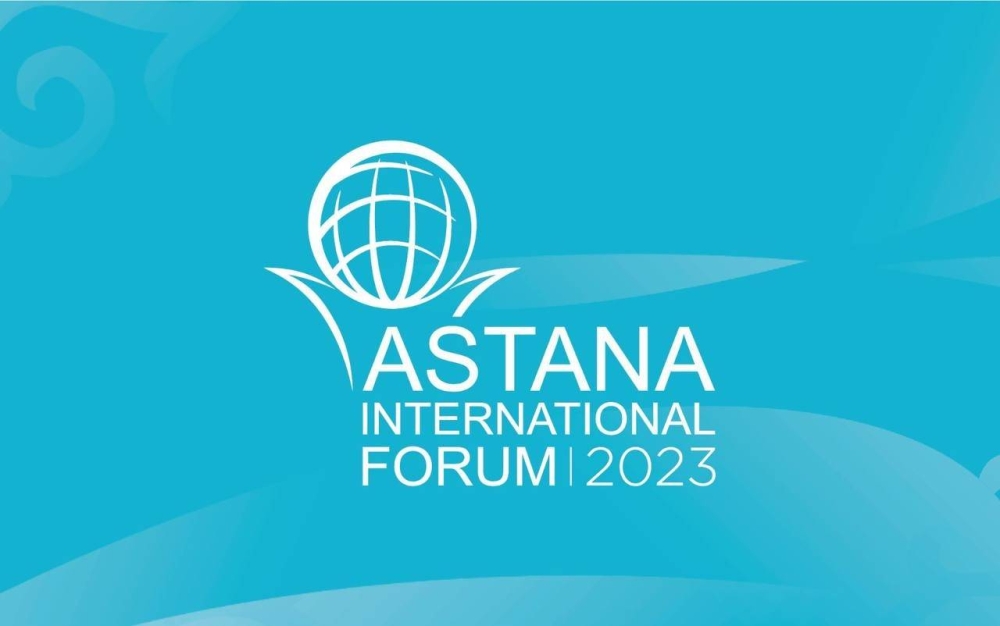The Astana International Forum will kick off Thursday in the Kazakh capital. Prominent delegates from governments and international organisations, as well as businessmen and academics, will engage in dialogue and search for ways to confront current global challenges, such as climate, food scarcity and energy security challenges.
Previously known as the Astana Economic Forum, the forum was first organised by the Kazakh government in 2008, and its new title reflects the broader range of topics that are set to be discussed at the forum.
The forum is held annually in Astana with the participation of more than 8,000 delegates from 100 countries.
The forum's edition for 2023, which is held under the slogan 'Our Mission,' aims to unite efforts to confront global challenges. More than 1,000 participants will attend the forum from around 70 countries, including leaders, heads of state, government officials and directors of international and multinational organisations.
The forum will include more than 40 panel discussions and side events covering various topics, such as rethinking peace, conflict and the global order, the future of pluralism, climate change, green transition, energy security, international diplomacy and security, as well as the United Nations' role in ensuring peace and security.
Topics will also include Central Asia and its role on the global stage midst new challenges, including water scarcity, trade routes diversification in the region and the possible opportunities for Central Asia to reinvent itself as a major global player.
Discussions will moreover cover modernising transport and logistics infrastructure, renewable energy and the evolution of carbon markets in the context of carbon neutrality, assessing progress on global health emergency preparedness and response, economic recovery and resilience-building measures, the impact of global supply chain disruptions on food security, the future of multilateralism and the adoption of major reforms in the energy sector.
The Astana International Forum is likely to highlight the importance of collective efforts, the need for diplomacy, dialogue and global partnerships to achieve long lasting peace and stability.
Regarding the launch of the forum, Kazakh President Kassym-Jomart Tokayev said that the world is facing historical challenges that it has not encountered in decades, noting that these challenges represent unprecedented pressure on the international community that creates new dividing lines and challenges towards globalisation and pluralism.
The Astana International Forum was established to respond to these challenges, by prioritising co-operation as a fundamental principle of an effective international system, he added.
The president noted that the forum is a new international event that will be a tool for rebuilding culture pluralism at a global level, adding that it will also provide a platform for voices that are often overlooked, in addition to discussing their views and positions on today's issues and proposing their own solutions.
He added that the Astana International Forum was established to address four major global issues, namely: foreign policy, security and sustainability, energy and climate, and economy and finance, noting that global peace and stability are currently under threat due to tensions between major world powers, and other international issues continue to put pressure on shaky international regimes and alliances, such as nuclear disarmament and the refugee crisis.
He indicated that the rise of nationalism and populism in many countries continues to complicate international relations, making it more difficult to find common ground on issues that require a co-ordinated global response. President Tokayev added that the second major challenge that requires global coordination is climate change, as its consequences have a devastating impact on the planet such as rising sea levels, extreme weather conditions and the loss of biodiversity.
He stressed that the world's dependence on fossil fuels makes it increasingly difficult to reduce greenhouse gas emissions and tackle climate change, stressing that the crucial role of the oil and gas industry in ensuring energy security and in the energy transition cannot be overlooked, as the energy transition is a complex issue that must be dealt with carefully to ensure that developing countries are able to improve.
In reference to the Covid-19 pandemic, President Tokayev said that it had led to severe global economic downfall, with many countries, businesses and individuals struggling to survive, adding that the rise of inequality in income and the ongoing trade tensions between major world powers has led to instability in the global economy. President Tokayev expressed that although these challenges may seem daunting, they can also be seen as opportunities for global cooperation and progress, highlighting that Kazakhstan has a long history of enhancing international relations since it acts as a bridge between East and West. He expressed his hopes of the outcome of the forum in building new bridges, overcoming shared challenges, charting new diplomatic, economic and political paths, and contributing to building a more stable, equitable and prosperous world.
The current state of the global economy indicates the importance of events such as the Astana International Forum. Over the past three years, the global economy has witnessed major shocks such as the Ukraine war and the outbreak of Covid-19, in addition to the current geopolitical tensions in Europe that continue to seriously affect the global economy, transport and logistics links and the cost of energy and food prices. Disruptions in supply chains have also affected inflation rates, increased food insecurity and had other negative effects on the global economy.
Millions have also fallen into poverty as a result of the sharp rise in the prices of basic food rations, especially in poor countries that rely heavily on imports for their food. Around 10mn people fall into extreme poverty, and the UN forecasts that 181mn people in 50 countries will fall into a food crisis in the near future.

